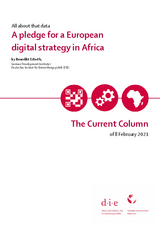The Current Column
All about that data
A pledge for a European digital strategy in Africa
Erforth, BenediktThe Current Column (2021)
German Development Institute / Deutsches Institut für Entwicklungspolitik (DIE), The Current Column of 8 February 2021
The global competition for digital leadership is in full swing. Between surveillance capitalism and state-led digital surveillance, the European Union (EU) seeks to promote a third model of a human-centric “safe and open global Internet”. Under the von der Leyen Commission, the EU has vowed to shake off its image as a second-tier digital power, and accelerate a structural transformation towards a green, sustainable, and digital economy – at home and abroad. For European Commissioner for Internal Market Thierry Breton, Europe must become nothing less than “the most data-empowered continent in the world”. To this end, the digital also has taken on a more prominent role in the EU’s vision of the future Africa-EU partnership.
In 2020, the EU demonstrated extraordinary zeal to realise these ambitions. It published Communications on Shaping Europe’s Digital Future and on a European Strategy for Data, a White Paper on Artificial intelligence, a proposal for a European Data Governance Act, and most recently a proposal for a Digital Services Act, all of which transmit the EU’s aspirations for global leadership and digitally enabled, sustainable growth. These initiatives are supported by the new seven year EU budget (2021-2027), which is geared to stimulate long-term digital transformation. Also, at least 20 percent of the total allocations in the COVID-19 Recovery and Resilience Facility are reserved for the digital transition.
Given that success or failure of a digital strategy will play out on the global stage, the EU’s strategy towards digital leadership must be decidedly outward-looking. Competition with the U.S. and China will intensify, while other regions move increasingly into the focus of the EU’s efforts to shape the global digital order.
Entering a digital partnership with Africa, the continent with the youngest and fastest-growing populations in the world, and which is already experiencing a surge in internet traffic, can help the EU realise its high-flying geopolitical aspirations. Rather than competing on its own, the EU stands to benefit from teaming up with its close neighbour.
Despite the increased attention it receives, digitalisation is still searching for its just place in EU foreign and development policy debates. Although, through its Digital4Development (D4D) framework, the EU has set out to mainstream digital technologies in its development policies and relations with third partner countries, the EU is missing a clear strategic agenda that would facilitate coherent policy making in this area. In their assessment of the EU’s external cooperation for development in the field of digitalisation in Sub-Saharan Africa, the Data Pop Alliance and ADE found that “no apparent patterns are evident, potentially indicating the lack of a coherent approach to reaping the cumulative effect of projects pertaining to D4D”. Admittedly, things are changing, but they have to change quickly.
What’s more, the EU’s discourse on digitalisation seems to be occurring in two largely disconnected spheres. On the one hand, we observe a hard-nosed, interest-driven and confident EU that seeks to establish itself as a standard-setter and leader in the digital world. On the other hand, the EU’s strategic vision for a digital Africa still remains timid. Interests are hardly pronounced and digitalisation is rarely seen as a self-standing issue and foreign policy goal. However, a partnership on equal terms requires an honest discourse that names interests and clearly identifies potential areas for cooperation as well as incompatibilities.
Arguing in favour of a distinct digital strategy with Africa goes beyond defending European interests abroad. Properly implemented, a partnership with Europe offers Africa the opportunity to co-create its digital future instead of mere alignment with existing systems. The EU’s proposal for a Comprehensive Strategy with Africa acknowledged the added value of cooperation by making “a partnership for digital transformation” one of its five pillars. The establishment of the AU-EU Digital Economy Task Force further and the launch of the Digital4Development Hub last December corroborated the desire to create a digital partnership – worthy of its name – around common objectives at project level.
Once mutual interests are known and acknowledged, the AU and the EU can give life to the proposed digital partnership. In particular, they can improve innovation ecosystems and begin to realise a safe and secure digital single market that works for its citizens and which is the declared goal of both the AU and the EU. The digital transformation will not by itself save the world, instead it serves as a powerful amplifier of our actions. It is up to Africa and Europe to spell out the meaning of the proposed human-centric model of digitalisation and establish the essence of a partnership that will lead to more inclusive digital economies and human well-being on both continents.


